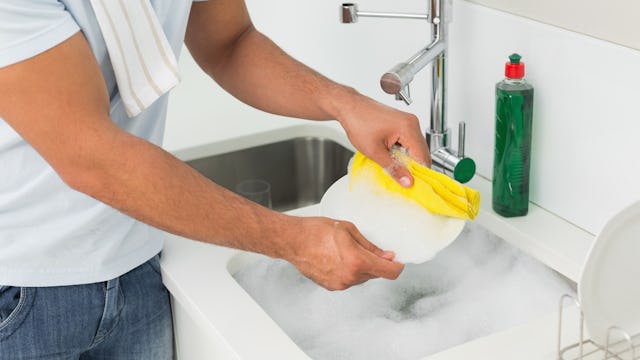Science Says Men Who Do Dishes Have More Sex

Couples who share in dish duty have more sex and are happier in general
I’ve been married for a long time and my husband is a wonderful man, so why do I want to throat-punch him while I’m doing dishes? Turns out, there’s science behind this wifely phenomenon, and the answer is simple — because doing dishes is the worst and if a couple isn’t sharing this crappy chore? They’re probably having less sex.
According to The Atlantic, a forthcoming report from Council of Contemporary Families confirms what we women have known since the beginning of time; out of all household chores, being stuck with dish duty is the one most likely to cause friction and resentment in a relationship — which translates to less sex. The study covers chores like shopping, laundry, and general housecleaning, and the common thread for women in heterosexual relationships is that a partner helping with dishes means a happier relationship.
Women who wash most of the household’s dishes report less satisfaction in their relationships, more conflict, and yes, a worse sex life. The report concludes that women who are able to share in the doing of the dishes are happier than they are about the splitting of any other household duties.
But why?
“Doing dishes is gross,” says Dan Carlson, an assistant professor of sociology at the University of Utah, and the lead author of the study. “There is old, moldy food sitting in the sink. If you have kids, there is curdled milk in sippy cups that smells disgusting.”
PREACH. Who wants to go have a romp in the bedroom after catching a whiff of week-old milk that no one else offered to help clean? Not this girl.
He also points out how totally thankless doing dishes really is. If you cook, at least your family might compliment the food. If you sew holes in their socks? A “thank you” usually follows. Clean dishes are just something everyone who doesn’t do them takes for granted. “What is there to say? ‘Oh, the silverware is so … sparkly’?” says Carlson.
The thing is, the most unpopular (and gross) household tasks are those normally relegated to women. Typically, chores falling under a wife’s jurisdiction involve cleaning up after others: Carlson lists laundry, cleaning bathrooms, and doing dishes as examples. But men? They’re often the ones responsible for taking out the trash, mowing the lawn, washing the cars, and other jobs that might even be kind of a respite from family life. Hell, my husband usually chugs a few beers before/during/after mowing the lawn or washing the cars. He seems to enjoy it.
*Makes mental note to start drinking wine while washing dishes.*
Carlson says women who do these messier chores that mean touching other people’s grossness “see themselves as relegated to the tasks that people don’t find desirable.” And if that’s the case, who wants to have sex with the person making part of that mess but also not helping you clean it up?
The good news is that in these modern times, it is getting better. More men are stepping up and doing stuff around the house that used to be solely the work of women. The CCF report notes that between 1999-2006, couples who share dish duty rose from 16 to 29 percent. That’s still a good two-thirds of couples not sharing the load when it comes to this grimy work, which can become an issue when women notice their friends who have partners that do help out. “The more often a task is shared, the worse it is for you not to share it,” says Carlson.
Overall, dishes are a unique chore in that they naturally lend themselves to teamwork and chit-chat. You can easily share dish duty because as Carlson points out, there’s washing and rinsing and drying to do. “My wife and I could take out the trash together, we could clean the toilet together, but that wouldn’t make much sense,” he says.
So if you’re in a relationship where you’re constantly getting pruned fingers and scrubbing sippies while your man chills on the couch, have a talk about sharing this awfulness with him. Maybe afterward, you’ll both be in the mood.
This article was originally published on